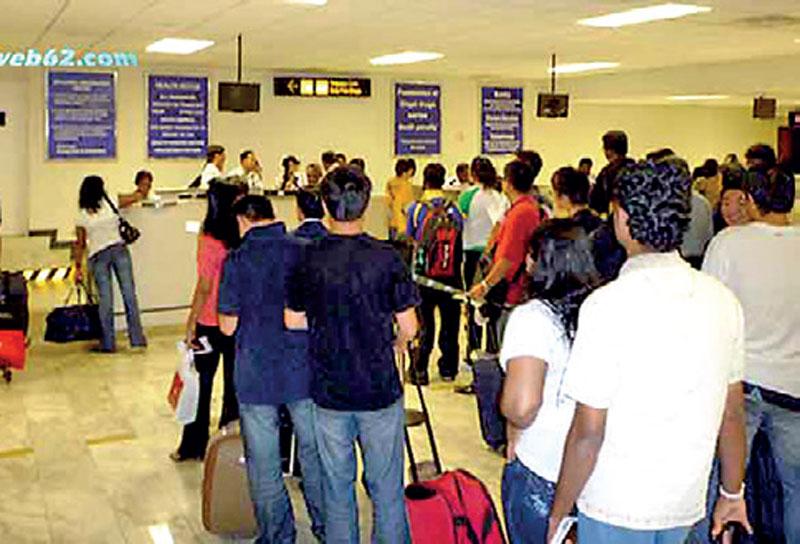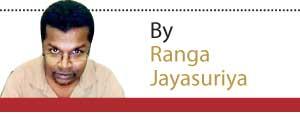25 Jan 2023 - {{hitsCtrl.values.hits}}

Sri Lanka faces a serious 'brain drain' as the country is facing the worst economic crisis, the young professionals prefer to leave the shores in search of greener pastures overseas.
 Gotabaya’s ill-thought-out tax reforms, undertaken at the behest of the rent-seeking business class that bankrolled his campaign, bankrupted the government, leading to a sovereign debt default Gotabaya’s ill-thought-out tax reforms, undertaken at the behest of the rent-seeking business class that bankrolled his campaign, bankrupted the government, leading to a sovereign debt default |

Sri Lanka’s professional classes are paragons of virtues at normal times. But, their bruised sense of entitlement at the new personal income tax revisions is nothing but a callous display of rent-seeking opportunism.
Last week, a group of professional organisations representing government doctors, university dons, engineers and banking employees took to the street against the government’s new progressive income tax. They warned that paying the personal income tax at a reduced tax threshold of Rs. 100,000 per month would wreak havoc, leading to an exodus of professionals. As if the greener pastures of the West are waiting in open arms, with jobs lined up. Try that!
In the meantime, for a self-sponsored developing world professional to get a job remotely on par with his native professional qualifications is two to three years - or probably never. Not to mention language requirements, not just as an entry requirement but also to land a decent job and cultivate personal circles. Again, assuming that these good fellas would land in one of those greener pastures, for instance, Australia, their preferred destination. Unless they live off the government subsidies or toiling at a pump earning a pittance, they would be paying 19% of earnings starting at AUS $ 18,201 (US$ 12,750).
When measured in purchasing power parity, the dollar stretches in Sri Lanka fourfold. (Sri Lanka’s GDP per capita in nominal US$ in 2023 is projected to be US$ 3,290, counting on projected negative growth of 3%, and GDP per capita measured in PPP is US$ 14,140, according to IMF projections). That would mean the practical threshold in PPP would be around a nominal US$ 3,000 (or Rs 1.08 million at the official exchange rate or around 1.15 million if you go by the black-market rate). That is more in line with Sri Lanka’s new taxable threshold.
In fact, Sri Lanka’s new tax is progressive taxation. With a starting tax rate of 6%, a person who earns Rs.150,000 monthly will have to pay only 2.3% of the total income, but the rate jumps to 28.7% for a person who earns Rs. One million a month. In contrast, you would pay an 18% starting rate in Australia.
Now, this is not a comparison between the living standard of two countries or other welfare measures that a richer high-tax economy could afford. After all, they did not pay for your free education with public money. Don’t misconstrue this as an attack on the professional class, who are an integral part and engine of economic growth and social welfare. But this is an enquiry into the hypocrisy of the anti-tax protests.
In November 2019, then-president Gotabaya Rajapaksa abolished taxes such as PAYE, NBT, withholding tax, Capital Gain Tax, Bank Debit tax and, reduced the VAT tax rate from 15% to 8%, and increased the personal income tax threshold to Rs.3 million. Gotabaya’s ill-thought-out tax reforms, undertaken at the behest of the rent-seeking business class that bankrolled his campaign, bankrupted the government, leading to a sovereign debt default.
Rajapaksa was forced out of power, but the ripple effects of his damage outlived his rule. His successors are scrambling to run the day-to-day affairs of the cash-strapped nation, beset by hyperinflation.
In a bid for fiscal consolidation, among other things, the government brought down the personal income tax threshold to 1.2 million per year or Rs. 100,000 per month. According to the new income tax in effect this year, individuals will be taxed at 6% per each Rs. 500,000 for their earnings over 1.2 million, with the maximum tax rate fixed at 36%.
Despite the seemingly low threshold, only 10% of Sri Lankan wage earners earn at the taxable threshold. Professionals are up in arms. Some folks have taunted Sri Lanka as a ‘land of tax’. What a load of nonsense! The government’s tax revenue is 7.6% of the GDP (in September 2022), which makes Sri Lanka the country with the least tax revenue in the world. Typically, in lower-middle-income countries, the government’s share of GDP is around 20-25%. Even in low-income countries, the governments collect, on average, 15% of domestic revenue. In contrast, in Sri Lanka, the government’s revenue as a GDP has declined from 19% in 2000 to 8% in 2021, while the country has elevated from low-income to middle-income status.
The professional classes blame the government for the economic collapse. On that, they may be right, but it is over-simplifying a cruel irony. Sri Lanka’s economy crumbled not just because its ex-president is an egoistic fool but because successive governments bankrolled a low-tax economy with public debt, subsidising everything from fuel to electricity.
Nor is it those expensive Chinese-funded projects that led to the tax default, but excessive borrowing in the form of sovereign bonds (which account for over 45% of the sovereign debt) to live beyond the means. The professionals want the government to fix the broken economy but are unwilling to pay their share. If they manage to tell how a government can do that without extracting its due share of national wealth, that could well win the next Nobel prize for economics.
This whole anti-tax activism is reeking of rent-seeking opportunism. Worst still, these are the people who benefitted most from Sri Lanka’s relatively well functioned welfare state. Its collapse was also partly due to successive governments being more at ease conceding to the vested interests of these well-off sectors of society than liberalising the economy, job market and investment laws. As a result, a few milked the system.
With all the hullaballoo of migration of professionals and Sri Lankan investors moving abroad- which again should be taken with a grain of salt, for most have just managed within a patronising monopolistic economic system- the government should consider moving ahead with a full force of economic liberalisation.
As for the professional classes, liberalising the entry requirements in the labour market would supplement any outward exodus. The government can recognise qualifications from any accredited commonwealth country to work in Sri Lanka, be it as doctors, engineers, or even journalists (for the latter, you don’t need a specific qualification, though, but a knack for news).
Rather than pampering a microscopic minority of well-to-do elites, Sri Lanka should redesign its economy to provide upward mobility to its bottom half of the population. A recent survey by a research group that works with migrant workers reveals that 50% of Sri Lanka’s migrant workers have education only up to GCE ordinary levels. The government should cater to this segment’s professional and personal development by creating job training opportunities and vocational training institutions, liberalising local labour markets, and cutting red tape on FDI.
Until that day, we will be a low-growth economy dictated by vested interests of feudal fortresses at the expense of the vast majority of its people.
09 Jan 2025 20 minute ago
09 Jan 2025 2 hours ago
09 Jan 2025 2 hours ago
09 Jan 2025 3 hours ago
09 Jan 2025 3 hours ago